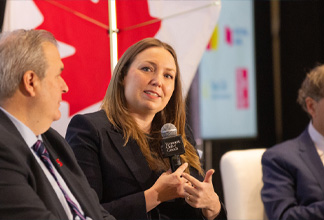Here’s What Every Canadian Should Know About Estate Planning
Written by The Inspired Investor Team
Published on November 17, 2025
minute read
Share:
Estate planning now involves challenges that didn’t exist a generation ago. Consider the true story of a British woman who had to go to court just to see photos of her late husband with their daughter. The images only existed in the cloud, and, without clear instructions laid out in an estate plan, the platform required a court order to release them.
“It’s tricky,” said Leanne Kaufman, President and CEO, RBC Royal Trust, in a recent conversation with Dimitri Busevs, President and CEO, RBC Direct Investing, and RBC Royal Distinction clients. What happens if you become inactive is “buried in the terms and conditions that you scrolled by and said, ‘I accept’ and never really read.”
It may seem extreme, but the story Kaufman shared illustrates how estate planning misconceptions can create real problems. Digital assets are just one example. Many people still believe that a Will alone is enough (it isn’t), that being an executor is an honour (it can feel like a part-time job), or that professional help is prohibitively expensive (it’s often not).
“[Estate planning] is shrouded in a little bit of mystery, not because it’s particularly mysterious, but people just don’t know what they don’t know.” said Kaufman.
Her conversation with Busevs aimed to clear up the most common misunderstandings and help Canadians feel more confident as they plan.
Here are some key insights from their discussion.
1. You need a Will and two powers of attorney
Most people know they should have a Will to most efficiently and effectively administer their estate after they die. But what they may not have factored in is the need to have a power of attorney (POA) or the equivalent in your province. There are two types that are relevant for this conversation: one that deals with your assets and property, and one that deals with your health and personal care decisions while you’re still alive but unable to make choices for yourself.
“You can’t use the Will for power of attorney, and once you pass away, the power of attorney ceases to exist,” said Kaufman.
Without a POA for property, even a spouse cannot automatically step in to make important decisions. Someone must apply to court, “and everything’s frozen,” she said. This can affect everything from paying bills to managing investments to selling a jointly owned house.
Despite the importance of estate planning, most Canadians still have significant gaps in their plan. An RBC Royal Trust survey found that 52 per cent of Canadians said they still didn’t have a Will, and 65 per cent said they didn’t have a POA, “which I find shocking,” said Kaufman.
2. Being an executor can be a lot of work
Being an executor involves more work than most people realize. While it feels like an honour to be asked (and people often accept for that reason), Kaufman said the reality can feel much different.
She often illustrates the point by asking audience members who’ve acted as an executor before to raise their hands, then asks them to keep their hands up to demonstrate if they would want to do it again. “Usually, all the hands come down,” she said.
Someone named as executor is effectively taking on a part-time job for “several months to years of their life.” The work can go well beyond distributing assets and can include everything from cleaning out the house to making sure all personal effects get distributed to beneficiaries.
Kaufman recommended asking potential executors whether they are willing and able to take on the role and making sure they understand what’s being asked of them.
Age and stage of life matter, too. “As we age, guess what, so do our friends and siblings,” Kaufman noted.
What happens if you’re named as executor but don’t want to act? You can renounce the position, but timing matters, said Kaufman. “It’s better if you [back out] before you start to act. If you get started and then want to stop, it may be a court process from there.”
3. Digital assets require specific planning
Digital assets present unique challenges. Anywhere you’ve entered a username and a password, Kaufman explained, you’ve likely entered into an agreement with a platform or provider. No one has the inherent right to access that data – not even a spouse – unless it’s spelled out in your estate plan, and even then, there can be challenges.
First, people you appoint to manage your affairs need to know that the digital account or asset exists. “Secondly, they have to be able to access it and access it legally,” she said.
Some digital assets have clear monetary value, like online investment accounts. But, Kaufman added, there are also “less tangible assets… that may only have emotional value or intellectual property–type value.” That can be everything from social media accounts to cloud storage containing family photos, videos and documents.
How best to handle digital assets is “a very bespoke question, because it depends on the nature of what we’re talking about, and every asset’s going to be different,” she noted.
She used cryptocurrency as an example. “If that information doesn’t make its way to your attorney or your executor, it’s as if that asset doesn’t exist. There’s no depository for lost crypto” where an executor can go looking for it.
4. Professional help is more accessible than you think
How much does it cost to hire a professional executor? Less than many people think, said Kaufman.
Across the country, the accepted amount that an executor can charge is 5 per cent of an estate’s assets, but not all charge that much, she explained.
RBC Royal Trust signs a fee agreement with clients that gets embedded into the Will. The firm uses a tiered rate, so the larger the estate value, the smaller the percentage charged on a blended basis.
RBC clients can also benefit from an additional perk, with any assets already at RBC receiving a 25 per cent discount off whatever the blended rate ends up being.
5. Hiring a trust company as your executor can be more flexible than you realize
Some people might assume that naming a trust company as your executor is all-or-nothing: either you do everything yourself or you hand it all over. In fact, there are different service levels.
RBC Royal Trust, for instance, can act as the sole executor, handling everything from cleaning out the house and distributing personal effects to managing assets and filing tax returns when appointed in your Will. There is also a co-executor option where RBC Royal Trust can act alongside another person, if both are appointed in your Will.
There are also what Kaufman called “agent for executor” services, where clients can pass all the administration to the trust company but retain decision-making authority.
A trust company also offers continuity that an individual cannot. “The corporation never dies. The corporation doesn’t lose capacity,” said Kaufman.
6. Getting started is simpler than you think
Life circumstances change, and estate plans should, too.
People tend to ‘set it and forget it’. Kaufman recommended reviewing your plan at least every couple of years. Major life events – like marriage, or a new house or grandchild – should also trigger a closer look.
Many people put off estate planning, thinking they have more time than they do. But you don't need to have all the answers or involve your family right away, said Kaufman. Start by engaging a planner, lawyer, or accountant. Write things down. Think about your goals. Then talk to family members about your expectations.
“You really just have to start somewhere,” said Kaufman. “Just one bite at a time.”
RBC Direct Investing Inc. and Royal Bank of Canada are separate corporate entities which are affiliated. RBC Direct Investing Inc. is a wholly owned subsidiary of Royal Bank of Canada and is a Member of the Canadian Investment Regulatory Organization and the Canadian Investor Protection Fund. Royal Bank of Canada and certain of its issuers are related to RBC Direct Investing Inc. RBC Direct Investing Inc. does not provide investment advice or recommendations regarding the purchase or sale of any securities. Investors are responsible for their own investment decisions. RBC Direct Investing is a business name used by RBC Direct Investing Inc.
RBC Royal Trust refers to either or both of the Royal Trust Corporation of Canada and or The Royal Trust Company. RBC Royal Trust and RBC Wealth Management are business segments of the Royal Bank of Canada. ®/TM Trademark(s) of Royal Bank of Canada. RBC and Royal Trust are registered trademarks of Royal Bank of Canada. Used under licence. © Royal Bank of Canada 2025. All rights reserved.
The strategies, advice and technical content in this publication are provided for general information only. This publication is not intended to provide specific financial, investment, tax, legal, accounting or other advice for you, and should not be relied upon in that regard. Readers should consult their own professional advisor when planning to implement a strategy to ensure that individual circumstances have been considered properly and it is based on the latest available information.
Explore More

7 Ways to Get Ahead Financially in 2026
How you might invigorate your finances and put your money to work more intentionally this year
minute read

Economic Outlook: Uncertainty is Here to Stay, So What's Next?
Takeaways from the Economic Club of Canada’s Annual Event
minute read

3 things: Week of December 15
What the Inspired Investor team is watching this week
minute read
Inspired Investor brings you personal stories, timely information and expert insights to empower your investment decisions. Visit About Us to find out more.







